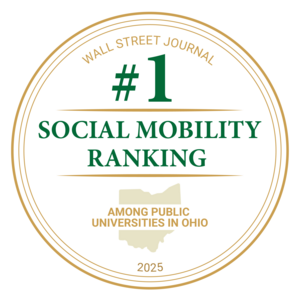Artificial Intelligence
AI Summer Camp
In the news:
AI Symposium
The RSCOB Symposium - AI and Machine Learning in HR: Exploring Potential and Unintended Consequences was a cutting-edge symposium on AI, Machine Learning, and HR designed for practitioners eager to explore the transformative potential of technology in the workforce.
Related article:
Business AI Minor and Microcredential
New for Fall Semester 2025, a business artificial intelligence minor will be offered for the first time at Wright State. The minor will broaden skills and develop interdisciplinary strengths around practical applications of artificial intelligence in business. Also available is the Business Artificial Intelligence Microcredential.
Future
AI Workshops for Industry Partners
Intel
13 faculty members across all business disciplines in the college (including accounting, finance, financial services, entrepreneurship, management information systems, marketing, human resources management, and supply chain management) as well as the interim Dean and Associate Dean completed an Intel orientation training at the end of January to learn more about their AI resources for global education. Intel specializes in different programs of digital readiness, including AI for current workforce development, which is what the RSCoB faculty took part in. This program seeks to enable and augment existing workforce capacity with AI skills for work and life impact. RSCoB is interested in the democratization of AI and providing ample opportunity not only for current students but the regional community to become more AI proficient. By working towards AI accessibility for all, RSCoB is living out its vision to create a positive impact on business and society by promoting sustained, inclusive and sustainable economic growth, full and productive employment and decent work for all.
Financial Literacy
In today’s world, college students face a range of financial challenges: managing student debt, establishing credit, creating and maintaining a personal budget, avoiding online scams, and navigating the ever-rising costs of living. Social media often amplifies these challenges, bombarding students with advertisements and influencers who encourage spending on frivolous products and services, draining both digital and physical wallets.
Recognizing the importance of financial education, the state of Ohio passed legislation in 2022 requiring all high school students to complete a half-credit course in financial literacy to graduate. This mandate reflects a growing expectation that young adults understand essential financial concepts such as banking, credit, budgeting, and insurance. However, the transition to independent living—whether in college, trade school, or the workforce—often reveals a lack of preparedness among undergraduates when it comes to real-world personal finance.
At Wright State University, we are committed to improving financial literacy throughout the Raider community. This commitment extends far beyond the traditional classroom and into the daily lives of our students, faculty, and staff.
Financial literacy plays a vital role in overall well-being—what we often refer to as “wellness.” Wellness encompasses physical, emotional, and intellectual health, and personal finance is a key contributor. Financial stress can lead to anxiety, indecision, and a diminished quality of life. Students who lack financial knowledge often make costly mistakes, such as missing credit card payments, neglecting insurance obligations, or consistently relying on expensive food delivery rather than cooking at home.
Through education, we aim to empower students to make informed and responsible financial decisions. A well-rounded financial literacy program teaches that the best decisions are made through research, careful planning, and emotional discipline—not impulsive reactions.
Wright State demonstrates its commitment to financial literacy through both curriculum and outreach. As part of the Wright State Core curriculum, all students are required to complete Personal Financial Decision Making. The Raj Soin College of Business is now offering a College Credit Plus (CCP) version of this course for current high school students, taught by highly capable faculty committed to student success. While this course provides a strong foundation in financial literacy, we recognize that fostering a culture of financial wellness requires ongoing education and engagement beyond a single class.
In addition, students have opportunities to apply financial theory through experiential learning, a core philosophy of the faculty at the Raj Soin College of Business. One notable example is the senior-level Real Money Investing course, where Finance majors manage a real $6.1 million investment portfolio of stocks and bonds. Ranked Top 25 nationally by assets under management among university-managed portfolios, this hands-on experience allows students to research securities, deliver presentations, and vote on investment decisions—giving them real-time exposure to risk analysis and financial decision-making.
Similarly, Financial Services majors participate in a Practicum, during which student teams work under the guidance of a Certified Financial Planner (CFP) to create actual financial plans for members of the Wright State community. Students conduct client meetings, analyze financial data, build retirement plans, and deliver formal recommendations—developing the practical skills they’ll need in their careers. The value of this learning experience is best described by one of our recent clients, “We just wanted to say again how extremely beneficial this was to us. It taught us a lot about our finances and we are excited that we have started implementing some of the recommendations even after the first meeting. Thank you!”
Financial literacy is an essential element of personal wellness, regardless of age or background. A financially educated community is a more resilient and empowered one, and is directly aligned with the Raj Soin College of Business’s desire to create a positive impact on business and society by promoting inclusive and sustainable economic growth, full and productive employment, and decent work for all.
At Wright State University, we are proud to contribute to the financial well-being of our students and the greater Dayton area by offering classroom education, community events, and real-world experiences. We invite the community to engage with and benefit from our financial literacy programs.
Related article:
Economic Mobility and Access
By equipping our students with entrepreneurial skills and real-world business experience, the college fosters economic mobility, empowering individuals to create opportunities not just for themselves, but for their communities.
Sandler Center for Innovation & Entrepreneurship

Wright Brothers Day
Organized by the American Marketing Association Wright State University, Wright Brothers Day celebrates the innovative spirit of Wright State's namesakes and researchers working on campus today.

Wright Venture
Wright Venture is modeled after “Shark Tank,” an ABC-TV reality competition series that features aspiring entrepreneurs making business presentations to a panel of potential investors.
Entrepreneurship Bootcamp for Veterans
The Reynolds and Reynolds Entrepreneurship Bootcamp for Veterans (EBV) supports the success of military veterans who are aspiring entrepreneurs.
- Learn more about the Entrepreneurship Bootcamp for Veterans program
Explore recent articles highlighting our efforts:
- Powerful partnership
- Profitable Pitch: Wright State grad used Wright Venture competition to kickstart successful roofing business
- Wright State alum Scott Bauer honored for career of service, leadership and innovation
- Wright State grad student’s startup wins annual entrepreneurship competition, aims to revolutionize food industry
- Dayton Business Journal: 3 ways the defense industry could help safeguard Dayton’s economy- Sponsored Content by RSCOB, By Joseph T. Traynor, M.S., Social and Applied Economics, Wright State University alumnus; Kevin Willardsen, Ph.D., Associate Professor of Economics, Wright State University


